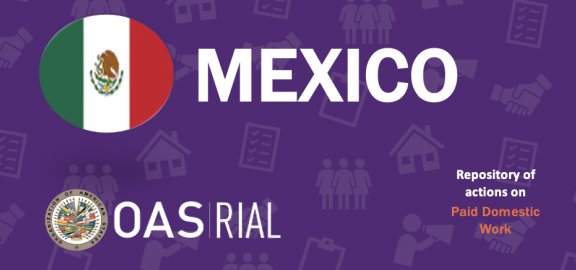Mexico - Repository of Actions on Paid Domestic Work
| Regulatory Information | |
| Ratification of the 189 ILO Convention | Yes, July 3, 2020. |
| Existence of an internal regulation for domestic work |
Yes.
As of 2019, with the amendment to the Federal Labor Law (LFT) and the Social Security Law (LSS), domestic workers are considered to have the same rights as all workers.
The LFT determines in its Article 331 Ter., that the employment contract will be established without distinction of conditions when it comes to migrant domestic workers.
On November 16, 2022, the reform to the LSS, regarding domestic workers, was published in the Official Gazette of the Federation (DOF). These modifications include the incorporation of Chapter XI on Domestic Workers, which indicates the obligation to register and enroll domestic workers in the Mexican Institute of Social Security (IMSS). |
| Areas of Intervention | |
| 1. Training and professionalization |
Workers:
There is a Distance Training Program for Workers (PROCADIST), which allows domestic workers to access general courses to develop their labor skills. Consult here.
The STPS, with the support of the French Development Agency, has promoted skills training, training and certification actions with CONOCER from the Ministry of Public Education.
The LFT determines, in its Article 283, Section X, that is it the obligation of the employer to collaborate with the Labor and Education Authorities, in accordance with the laws and regulations, in order to achieve the literacy of workers and their families.
Employers:
Through the dissemination campaign that the STPS is carrying out, it seeks to train and sensitize employers about the rights and obligations established by the LFT, regarding domestic work.
|
| 2. Dissemination and awareness-raising |
The Secretariat of Labor and Social Welfare (STPS) has a space designed on its website to consult the rights and obligations of the parties, a Guide to promote decent work, employment contract models, guides for IMSS registration, and the queries that workers and employers can make at the current professional minimum wage, which is updated year after year.
In this sense, work is being done on the design and dissemination of consultation infographics on the labor rights of domestic workers. Likewise, articles have been published making visible the importance of this work. Consult here.
A campaign is being carried out to disseminate the rights of domestic workers based on the document “The pilot test for the incorporation of domestic workers into the Mexican Institute of Social Security. Study of results and recommendations for the mandatory regime”, prepared with the support of the ILO, for whose integration the strategic actors of the sector were interviewed.
As the first activity of said campaign, a National Lottery ticket was issued to commemorate March 30, the International Day of Domestic Workers. The main objective of the campaign is to make visible the labor and social security rights of domestic workers.
A protocol act was held with the presence of the Head of the STPS and the National Lottery on the occasion of the issuance of the lottery ticket, and messages were disseminated on the Secretariat’s social networks.
It is important to highlight that differentiated messages are carried out for the domestic worker population and employers. |
| 3. Inspection | The Secretariat participates in a working group with the ILO to find innovative alternatives to find labor inspection mechanisms that promote the right to decent work and that harmonize in practice with the regulations in Mexico, in which the private address is configured as a workplace, which makes it a more complex inspection. |
| 4. Social Security Coverage |
As of the reform of the Social Security Law in November 2022, employers of domestic workers have the obligation to enroll them in the social security system.
The second phase of the Pilot Program for the Incorporation of Domestic Workers is currently underway, which consists of simplifying the IMSS affiliation process, to guarantee their human rights to health and social security: (work risks; illnesses and maternity; disability and life; retirement, unemployment in advanced age and old age; and nurseries and social benefits). It is important to mention that, although it is still called the Pilot Program, the employer has the obligation to affiliate the domestic worker who works at their home.
In this sense, the IMSS is the institution that manages the platform for the registration and affiliation of the domestic worker population.
In addition, there is a Guide to promote decent work in domestic work, which has information on the rights that domestic workers are entitled to, as well as the benefits that arise from their registration with the IMSS. Consult here. |
| 5. Alliances with social actors |
The Secretariat has established a close relationship with the Support and Training Center for Domestic Employees (CACEH), as well as the National Union of Domestic Workers (SINACTRAHO).
Similarly, the STPS participates in a working group with government institutions and civil society organizations that promote decent working conditions for domestic workers, in particular, the application of ILO Convention 189. |
| More information | |
| The Supreme Court of Justice of the Nation (SCJN) declared unconstitutional and discriminatory that social security was voluntary for domestic workers. | |
*Information reviewed and approved by the Ministry.




